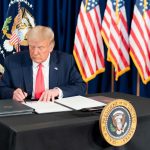House Speaker Mike Johnson’s ambitious plan to tie the raising of the nation’s debt limit to a sprawling border, tax, and energy package appears to be encountering turbulence within Republican ranks. In a scenario that wouldn’t be out of place in a political thriller, the grand strategy championed by President-elect Donald Trump, synonymous with a bold conservative future, seems to be meeting a fair share of skepticism from the GOP.
The situation surrounding the debt limit has taken on a fluid quality, leaving many speculating where the negotiations are headed. Johnson, who hails from Louisiana, previously expressed firm intentions to incorporate the debt ceiling extension into Mr. Trump’s extensive priorities. Just a week later, however, those steadfast beliefs seem less certain. Johnson has suggested that while he is trying to gather support among fellow Republican members, he’s not entirely committed to his original plan, making it seem as if the wind has shifted rather quickly within the halls of Congress.
BREAKING: Speaker Johnson is considering tying the debt limit to California wildfire aid.
Imagine if Biden said he wouldn’t provide aid to Florida after Hurricane Ian unless the US government agreed to spend trillions of dollars more.
“Consevatives”pic.twitter.com/68pfJ2CJcK
— Brian Krassenstein (@krassenstein) January 14, 2025
By employing the filibuster-proof reconciliation process to raise the debt limit, Johnson sought to dodge the inconvenience of negotiating with Democrats. This would supposedly attract a handful of House GOP members who have historically voted against such measures. It is not surprising that he opted for this route in hopes of sidestepping the partisan gridlock that often plagues D.C. However, the reality of a fractured GOP and the presence of a thin majority complicates matters significantly.
In a past encounter, Trump had insisted that Johnson ensure that any government-funding bill also addressed the debt limit. Those discussions revealed the sharp divide within the party as established Republican debt hawks swiftly shut down the effort, instead allowing for a two-year extension paired with a hefty $1.5 trillion increase. This compromise supposedly hinges on a $2.5 trillion reduction in spending. However, therein lies the rub: how many self-proclaimed fiscal conservatives will truly stand up when it counts?
A separate standalone bill to tackle the debt limit, reminiscent of the 2023 strategy when former Speaker Kevin McCarthy and President Biden cobbled together a dubious agreement, now seems one of the fallback plans. This option disheartens hardliners who prefer to keep things in a reconciliatory package for the sake of avoiding the dance with Senate Democrats.
Furthermore, Speaker Johnson has floated the idea of tagging the debt-limit waiver onto a much-needed emergency assistance package for wildfire relief. While this strategy could drum up some bipartisan support, the Democrats have pushed back, alleging that the GOP is playing political games with disaster aid. Despite this clash of viewpoints, there is growing concern among Republicans about the possibility of Democrats using any opportunity for leverage, which is a scenario they are more than eager to avoid.
So, what does this all mean moving forward? The path to consensus on how to address the debt limit looks as tangled as a New York City subway map. A historically thin majority among House Republicans complicates any attempts at unity. The fight to ensure that core conservative principles do not get compromised amidst fiscal negotiations is likely to be a contentious battle, one where the stakes are high and the margin for error is slimmer than ever. The coming weeks in Congress will likely serve as a litmus test for the current Republican leadership as they strive to meet the expectations of their constituents without conceding precious ground. Stay tuned for what comes next in this legislative saga.




